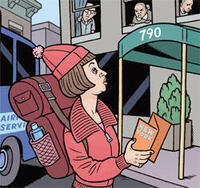HABITAT
From the Editor: How to Get Smart About Illegal Sublets
Written by Tom Soter on December 31, 1969
A monthly column by HABITAT's editorial director.
March 2, 2011 — "Hey, Tom," my brother Pete said to me softly. "Look over there. Isn't that Barbara Feldon?" He pointed across the crowded theater lobby at a tall woman chatting with a couple of people. Sure enough, it was "Agent 99" from a favorite TV comedy, Get Smart.
"Yes, it is," I replied, always amazed at Pete's ability to spot a celebrity.
"Would you like to meet her?"
New Law Bans Short-Term Co-op & Condo Rentals
Written by Frank Lovece on December 31, 1969
July 2, 2010; updated July 14 and July 25, 2010 — On Friday (July 23), Governor David Patterson signed legislation banning temporary vacation sublets not just in rental but also co-op and condominium apartments — while allowing brownstone owners and single-family home owners to retain their full property-ownership rights. Continue reading for the full, original story and the new law's implications.
When Condo Owners Turn Apartments into Hotel Rooms: What Boards Can Do
Written by Bill Morris on December 31, 1969
In a condo on Manhattan's Upper West Side, a resident's practice of renting his apartment to a string of transient visitors has the condo board concerned and even fearful. Given the state of the global economy, the demand for short-term accommodations in New York City isn't likely to slacken, with Europeans in particular flocking here to take advantage of the weak dollar and the bargains it affords on everything from clothes to computers. So what can a condo association — as opposed to a more strictly regulated co-op corporation — do to keep its the building from becoming a de facto hotel?
Are Surveys a Practical Way to Gauge How Your Residents Feel About Things?
Written by Ruth Ford on May 01, 2014
A 300-unit high-end co-op in Queens recently staged a large hallway renovation. Such aesthetic decisions can often lead to uncivil wars between the residents and the board, but this design scheme went forward without a single shout.
The reason? The co-op board members conducted a survey.
Wait... HOW Many Balconies Does Local Law 11 Say to Inspect? ALL of Them??
Written by Jennifer V. Hughes on April 30, 2014
After a woman recently fell to her death when a high-rise balcony gave way, New York City updated its well-known façade-inspection law, Local Law 11, now called the Façade Inspection and Safety Program (FISP), which applies only to buildings higher than six stories. The biggest change for co-op and condo boards is that inspections must now include the railings of balconies, terraces, roofs and even some fire escapes, Does that mean an inspector has enter into every apartment in the building with a balcony in order to do that?
New York State Tax Break Finally Coming to Co-op and Condo Owners
Written by Frank Lovece on April 29, 2014
State Senator Tony Avella (D-Bayside) officially announced last week the inclusion of a tax-relief program for small homeowners, renters and co-op and condo owners in this year's New York State budget. After the original proposal entailed tax relief solely for renters, Avella introduced legislation to include condominiums and cooperative owners and other homeowners.
How Much Will the New, Expanded Local Law 11 Inspections Cost Boards?
Written by Jennifer V. Hughes on April 24, 2014
Following a recent fatal accident involving the failure of a high-rise balcony, the well-known Local Law 11 (LL11) was updated to include not simply façade inspection every five years but also inspection of the railings on balconies, terraces, roofs and even some fire escapes. So just how much will this expanded LL11 — now called the Façade Inspection and Safety Program (FISP) — cost condo and co-op boards?
Assess for Capital Improvements? Borrow? Do Both with "Split Funding"
Written by Patrick B. Niland on April 24, 2014
Special assessments are the traditional vehicle through which condominiums have raised money for repairs and capital improvements. While relatively simple in concept, assessments have two drawbacks in practice. First, they usually take a fair amount of time to collect since most unit-owners don't have a lot of idle cash available. Second, most assessments place the entire financial burden of capital improvements on current unit-owners instead of spreading it over the useful lives of those improvements.
Fidelity Bonds & Theft Insurance: The Basics
Written by Mitch Warner on April 08, 2014
Fidelity bonds are a form of insurance that covers policyholders for losses incurred as a result of fraudulent acts by specified individuals. Also known as crime policies and employee theft insurance, this wasn't even on the radar of many cooperative and condominium boards until a few years ago. Then the mortgage crisis hit. Suddenly, Fannie Mae and Freddie Mac, the government-sponsored giants that purchase many co-op and condo loans from the original lenders, announced they would begin enforcing a rule that had been on the books — but widely ignored — for years. Is your building following it?
Does Resident Apathy Affect Your Building? Does Anyone Care?
Written by Tom Soter on April 22, 2014
The board member was angry about a widespread concern: The shareholders in his Queens co-op didn't seem to care much about the issues facing the property. As long as the maintenance remained low, they didn't want to get involved. There was one thing about which some of them were anxious, however: one of the residents was accused by some of being a thief. The angry co-op board member suggested a solution: "Put the thief in charge of the building, and soon, apathy won't be a problem."







